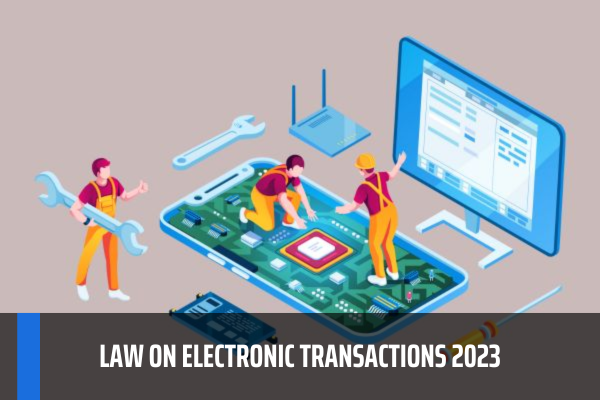Is there the latest Law on Electronic Transaction 2023? What are the outstanding new regulations of the Law on Electronic Transactions 2023 compared to the current Law on Electronic Transactions in Vietnam?
- Vietnam: What are the regulated entities of the Law on Electronic Transactions 2023?
- What are the outstanding new regulations of the Law on Electronic Transactions 2023 compared to the current Law on Electronic Transactions in Vietnam?
- Vietnam: When does the Law on Electronic Transactions 2023 apply?
Vietnam: What are the regulated entities of the Law on Electronic Transactions 2023?
Pursuant to Article 2 of the Law on Electronic Transactions 2023, it is stipulated as follows:
Regulated entities
This Law applies to agencies, organizations and individuals directly involved in electronic transactions or relating to electronic transactions.
Accordingly, the Law on Electronic Transactions 2023 applies to agencies, organizations and individuals directly involved in electronic transactions or relating to electronic transactions.

Is there the latest Law on Electronic Transaction 2023? What are the outstanding new regulations of the Law on Electronic Transactions 2023 compared to the current Law on Electronic Transactions in Vietnam?
What are the outstanding new regulations of the Law on Electronic Transactions 2023 compared to the current Law on Electronic Transactions in Vietnam?
The National Assembly has just issued the latest Electronic Transactions Law, the Law on Electronic Transactions 2023
Accordingly, compared to the Law on Electronic Transactions 2005, the Law on Electronic Transactions 2023 has the following outstanding changes:
First: Amend the cases where the Law on Electronic Transactions applies
- Clause 3, Article 1 of the Law on Electronic Transactions 2023 stipulates as follows:
If other laws permit or does not specify whether a transaction can be carried out electronically, this Law shall be applied. If another law does not permit a transaction to be carried out electronically, such law shall be applied
- Currently, Article 3 of the Law on Electronic Transactions 2005 stipulates the following cases of application of the Law on Electronic Transactions:
In case of difference between the provisions of the Law on E-Transactions and other provisions of law on the same matter related to e-transactions, the provisions of the Law on E-Transactions shall apply.
Accordingly, the Law on Electronic Transactions will help many other existing laws take immediate effect in the digital environment.
Second: Modify and supplement some concepts in electronic transactions
Accordingly, in Article 3 of the Law on Electronic Transactions 2023, amending and supplementing a number of concepts about digital signatures, electronic signatures, timestamps, electronic contracts, digital data, electronic environment, electronic certificates, digital signature authentication services, intermediaries,...
Third: Modify prohibited behaviors in electronic transactions
Prohibited acts in electronic transactions in Article 6 of the Law on Electronic Transactions 2023 provide more detailed and specific regulations on prohibited content and acts, creating favorable conditions for compliance with the law.
Fourth: Add conditions for converting forms between paper documents and data messages
In Article 12 of the Law on Electronic Transactions 2023, it is stipulated that data messages have the same value as documents, data messages have the same value as the original, data messages have the value of being used as evidence to create a legal basis for practical implementation.
Fifth: Requirements for a digital signature to be an electronic signature
According to Clause 3, Article 22 of the Law on Electronic Transactions 2023, a digital signature is an e-signature fully satisfying the following requirements:
- The signature must be added to recognize the signatory and assert the signatory’s approval for the data message;
- Digital signature creation data must solely accompany the approved data message;
- Digital signature creation data must be under the sole control of the signatory at the point of time when the signature is added;
- All changes of the data message after adding the signature are detectable;
- The signature must be secured by a digital signature certificate. A civil service digital signature must be secured by a digital signature certificate of a civil service digital signature authentication service provider. A public digital signature must be secured by a digital signature certificate of a public digital signature authentication service provider;
- Signature creation device is responsible for qualifying that digital signature generation data must remain confidential, unique and protected from forgery; and data used to generate the digital signature is designed to be used only once; and it does not affect the data to be signed.
Accordingly, compared to the current regulations of the Law on Electronic Transactions 2005, the Law on Electronic Transactions 2023 has regulations on requirements for digital signatures to be electronic signatures.
Sixth: Legal value of electronic certificates
In Article 19 of the Law on Electronic Transactions 2023, regulations on the legal value of electronic certificates are as follows:
- Information contained in an e-certificate shall have legal value if:
+ The e-certificate is signed by a digital signature of an issuing agency or organization according to regulations herein;
+ Information contained in the e-certificate is accessible and intelligible so as to be usable in its final form.
+ If any law requires a determination of time related to the e-certificate, the e-certificate shall contain a timestamp.
- An e-certificate issued by a foreign competent agency or organization, in order to be recognized and used in Vietnam, must be granted consular legalization, unless the consular legalization is exempted according to regulations of Vietnamese law.
Accordingly, compared to current regulations, the new Law on Electronic Transactions has supplemented regulations on the legal value of electronic certificates.
Seventh: Supplement reliable services in electronic transactions
In Article 28 of the Law on Electronic Transactions 2023, regulations on Trust services are as follows:
A trust service includes:
- Timestamping service;
- Data message authentication service;
- Public digital signature authentication service.
Eighth: Supplement specific regulations on types of information systems serving electronic transactions; electronic trading account; Responsibilities of the owner of the information system serving electronic transactions, especially with intermediary digital platforms serving electronic transactions with scale, number of users in Vietnam or number of monthly visits from large and very large users in Vietnam in Chapter VI of the Law on Electronic Transactions 2023.
Vietnam: When does the Law on Electronic Transactions 2023 apply?
Pursuant to Article 52 of the Law on Electronic Transactions 2023 as follows:
Effect
1. This Law comes into force from July 01, 2024.
2. Law on Electronic Transactions No. 51/2005/QH11 shall be no longer valid from the date on which this Law comes into force, except for the case specified in Article 53 of this Law.
Accordingly, the Law on Electronic Transactions 2023 will take effect from July 1, 2024.
The Law on Electronic Transactions 2005 expires from the effective date of this Law, except for the cases specified in Article 53 of the Law on Electronic Transactions 2023.
LawNet
